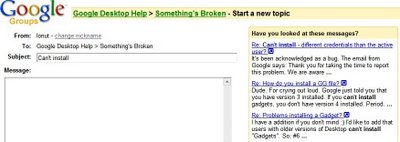
Some Google Groups have an interesting feature. While typing the title of a new topic, Google will show similar topics in a sidebar. This is useful to reduce the number of duplicate posts, as most user don't search for topics before submitting a new one. This implicit search is very powerful and it's currently implemented in the groups owned by Google (like Google Desktop group), but it will most likely be extended to the rest of the groups.
If you have a technical problem or you want to monitor a specific topic, you can also create alerts. There are two kinds of alerts: instant alerts (you'll be notified as soon as Google finds a new match for your query) and digest alerts (you'll get a daily or weekly digest if anything new is found). Besides groups alerts, you can also select web search alerts and news alerts. As Google explains:
"A 'News' alert is an email that lets you know if new articles make it into the top ten results of your Google News search. A 'Web' alert is an email that lets you know if new web pages appear in the top twenty results for your Google Web search. A 'News & Web' alert is an email that lets you know when new articles related to your search term make it into the top ten results for a Google News search or the top twenty results for a Google Web search. A 'Groups' alert is an email that lets you know if new posts make it into the top fifty results of your Google Groups search."
You can add operators to your group alert. Some examples:
* add [author:email@gmail.com] to restrict a search to posts created by an author. Be sure to use the author's posting email address.
* add [insubject:query] to search only on the subject lines of the posts. For example, if you want to find posts that contain Google Mini in the subject line, type [ insubject:"google mini"].
Google Groups is a good place to solve technical problems and most Google products have a support group.



